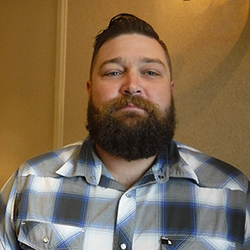By Shaun Ekert

In times of chaos and upheaval—and in life these times are always looming, if not obvious—the most import thing we can do as an industry, as an association, and as individuals is be resilient and come together. Right now, today, we are talking about COVID, but it isn’t just about this one event. Many things can happen—economic crash, earthquakes, pandemics—and the same need for resilience and holding one another up applies. Survival is not a flat line. It is a rolling, turning, fluctuating swoosh from which we learn and grow, if we choose to.
The questions about staying economically lucrative and supporting our livelihoods are extremely important, and the entire country is asking them. Answers trickle in a little each day. But, what about the value of looking past regular politeness and small talk to really connect with others in a meaningful way? Mental and social health are as important as economic health—maybe more so. How can we reach out and do right by one another, and how will this help us stay connected and move forward in a more cohesive way when this is all over?
When we get to thinking about economics, we need to start at home. Crisis should make us rethink our spending habits—since we go out less, we learn to live without all the unnecessary junk. That leaves us with more disposable cashflow, which we should be using to shop local (which is more expensive but higher quality) and support our neighbours who really depend on our dollars.
How important is technology right now? Zoom, chat, document sharing, social media—these are all life and business changers, and because of them in many cases the money keeps flowing and the mental health ticker stays on the healthy side. There’s a win-win.
Finally, what do we want as an industry? Do we want projects to stay on to protect our incomes and families? Or, do we want them shut to protect our health? In trying times, cohesion is the answer. We must make collective decisions when appropriate and do what is best for our businesses, crews, and selves when the opportunity affords. Most importantly, we have to reserve judgement if someone chooses differently than we would. We are all in this together, not just as an industry or as a sector or as a region. It is wide-sweeping and we are all human.
Adjustments have been made, and deadlines may slide. The other day, I was talking to a vendor in another country and he was apologizing for the noise his kids were making in the background. I was happy to connect with him and tell him, “Don’t worry. We all have these situations.” It’s truly authentic. No fluff, no hiding. In times of forecasting, speculation, and daily changes, we must embrace was is real and authentic.
Of course, there are pockets of hope, so focus there. You are 10 times more likely to succeed if you verbalize the positive, and you are 40 to 70 times more likely to fail if you verbalize the negative. There is no arguing with that math.
These times are showing people’s true hair roots, true personality colours, true family life, and true business situations, and it is a grassroots or throw back to what actually makes people tick and operate. Remember to keep it simple and be kind to yourself—just look at the kids. They are the ones who have adapted easily while we adults run about frantic for answers and surety. Take the time to breathe, stay calm, and be smart. This too shall pass, and when it does we will be closer and more authentic for the experience. ▪



